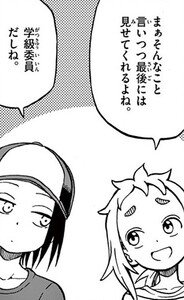Contradicting with 〜つつも
Grammar: Reason and Cause » 〜つつも
つつも is used when one feels a certain way, yet acts in a way that is in contradiction.
The clause before つつも expresses the feeling, and the portion after つつも is the actual action.
The feeling portion often uses a verb such as:
- 思う
- 知る
- 気になる
- 気にする
- 感じる
- 言う
Further Reading
- [JLPT/N2文法]14-4つつ(も)[ゆみせんせい] (youtube.com)
Examples
That said, aren't you interested in him with 〜つつも

Makoto and her family head out on a trip to the river. When they stop to pick up Kei’s friend Nao, Akane greets her with, “Howdy, Kei’s girlfriend!” Nao tells her she’s wrong.
- 圭:
- 「よっオレのカノジョ」
- “Yo, my girlfriend.”
- なお:
- 「やめてよ」
- “Stop that!”
- 茜:
- 「と言いつつ気があったりするんでしょ?」
- “Although you say that, you're interested in him, aren't you?”
Note: Here, も is dropped from つつも.
That said, she'll still show her homework with 〜つつも

As summer break is half over, talk of summer homework comes up. Yukari says she won’t let Mina copy off of hers.
- ミナ:
- 「まぁそんなこと言いつつ最後には見せてくれるよね」
- “Well, even though she says that, she'll show it to me in the end, you know.”
- サナエ:
- 「学級委員長だしね」
- “She is the class representative, after all.”
Note: Here, も is dropped from つつも.